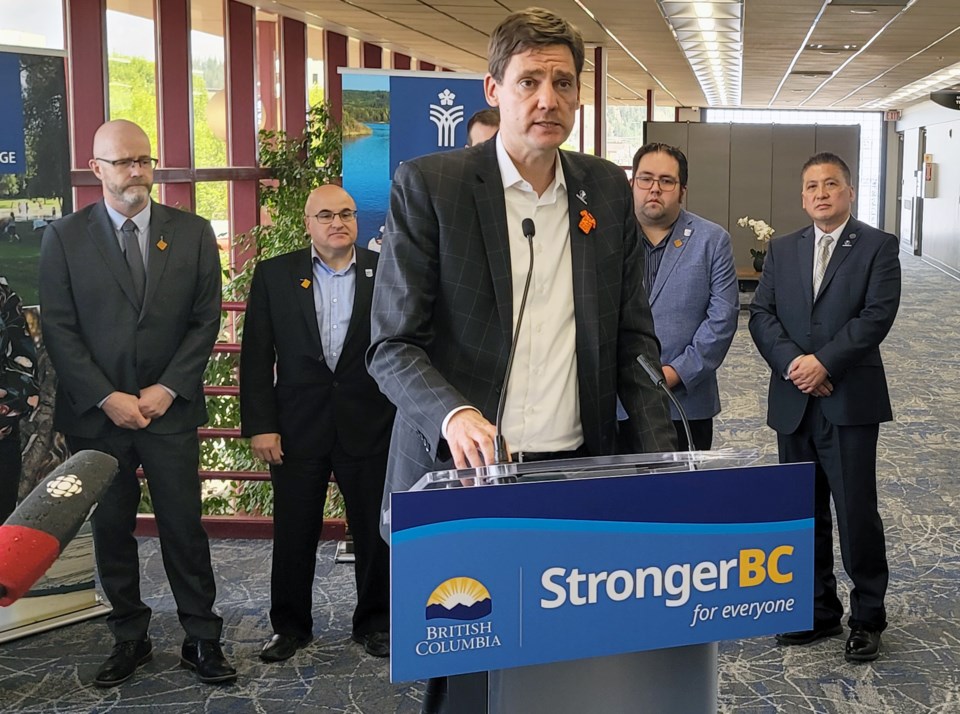The province and the City of Prince George have formally agreed to jointly address the local homelessness situation in a concerted effort to fast-track temporary shelters and build new permanent housing for people sheltering outdoors.
The agreement signed by Premier David Eby and Mayor Simon Yu also ensures a commitment to prevent new camps from becoming entrenched by having the necessary supports in place to get people off the street.
The premier met with Yu and city council at the Civic and Convention Centre for a discussion on problems plaguing Prince George, including the lack of affordable housing, encampments, rising crime and the opioid crisis.
“One of the most pressing concerns we heard this morning from mayor and council is people in Prince George can’t find housing,” said Eby. “This is leading to dangerous encampments, dangerous for the people living in them and distressing to the community as a whole.
“The situation here and in other cities is incredibly concerning. We’ve seen thefts, fires and assaults and we know the encampments aren’t safe for anyone, not for neighbouring communities, not for businesses nearby and most of all not for the people who are living in them.”
The partnership will spawn two new programs.
The Homeless Encampment Action Response Teams (HEART) program funded by the province in partnership with local government, First Nations, Northern Health, and non-profit groups will give the city the ability to respond quickly to encampments and provide the supports and service needed to put a roof over the heads of the city’s estimated 300 homeless people.
The Homeless Encampment Action Response Temporary Housing (HEARTH) program will provide emergency housing and shelter options and immediate support to help people living in camps or public spaces get inside to access temporary or permanent housing that fits their needs.
“Our goal here is to close the encampment and get people inside,” said Eby. “This announcement reflects commitments made in our provincial budget, which means there are dollars available for the pieces that need to be done.
“Often when we rely on charitable organizations or smaller non-profit organizations to do this work, where they have central coordination authority, it ends up being just that, charity or maintaining people in that encampment. We’re bringing additional resources that will enable the coordination of those resources to get people out of the encampment and into housing, as well as money to open up temporary spaces and permanent spaces to close these encampments.”
Eby said similar work is being done in Vancouver and Kelowna, where those cities have also promised to open up more housing for the homeless and he committed to exploring new ways to get social housing built in Prince George.
In recognition that close to 80 per cent of the city’s homeless population is Indigenous, Eby also promised to engage in First Nations and other Indigenous organizations to ensure people have access to culturally appropriate care.
Yu sees the partnership with the province as “light at then end of the tunnel,” but he says the clock is ticking and a housing solution has to be found before cold weather arrives. One possible solution for temporary housing he would consider would be to set up a workcamp-style projects using portable trailers. He said some buildings in the downtown core are in the process of being converted to housing.
“We have a small window before the winter and we want to make sure there are enough heated and winterized units so the people on the street and in encampments right now have a place to go,” said Yu.
“We have identified land that is best-suited to have this temporary transition housing built at rapid speed to make sure the transitional housing plays a key component. The province has a $500 million program to convert an occupied program into housing units and so the people in charge of this program were in town and met with us to ask us to identify some areas where they can do this program immediately. We need to build an affordable, happy community.”
Yu said the city needs an accurate count of how many people need housing. He estimates about 25 people live at the Millennium Park encampment, 50 or 60 at Moccasin Flats and that the entire city has about 300 homeless people.
Terry Teegee, regional chief of the B.C. Assembly of First Nations, was encouraged by the new partnership and the plan to develop a holistic approach to tackling homelessness in Prince George.
But Teegee stressed the importance of making sure the rights of the homeless are protected, as they were in February 2022 when the B.C. Supreme Court denied the city’s application to close the Moccasin Flats encampment.
“As we’ve seen at Moccasin Flats and other encampment areas in Prince George, the homeless do not have a voice and there were bylaws and other initiatives to displace them,” said Teegee.
‘Far too often, as we’ve seen here in Prince George, 80 per cent identify as Indigenous, so far too often our Indigenous peoples are overrepresented. This is an opportunity to change a relationship, because right now, what has been happening does not work for the homeless, and we need more support and services not only for affordable housing but also for dealing with the issues of addictions and mental health.”



.png;w=120;h=80;mode=crop)